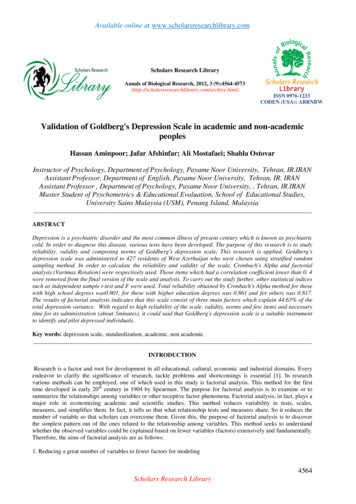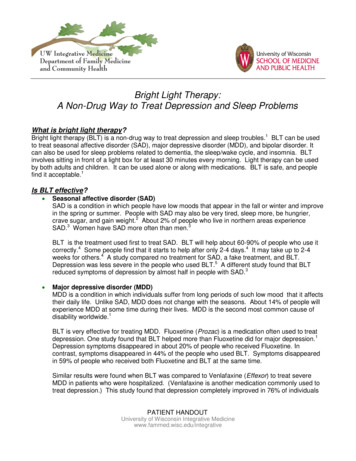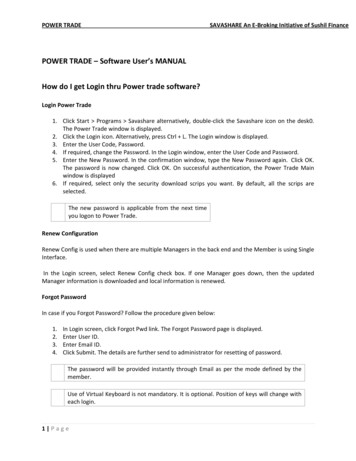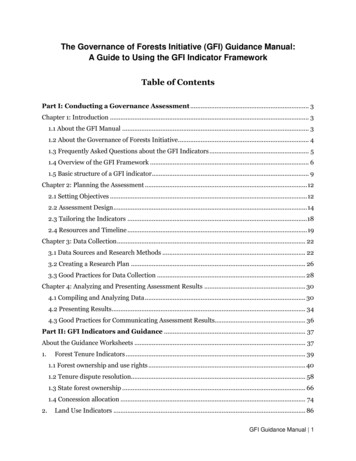
Transcription
beyondblue: the national depression initiativewww.beyondblue.org.au1300 22 46361300 bb infoMensLine Australia1300 78 99 78www.menslineaus.org.auEmail: talkitover@menslineaus.org.auRelationships Australiawww.relationships.com.auImportant thoughts e.g. keep the kids’ future in mindWrite yours belowMen and Separation1300 364 277Relationships Australia offers counselling, family disputeresolution, family violence programs, parenting andrelationships courses and other relationships services;across Australia.www.relationships.com.auNavigating the Future1300 364 2771300 78 99 78 (24 hours – seven days a week)MensLine Australia provides telephone counselling,information and referral services for men with familyand relationship concerns. This service is available fromanywhere in Australia for the cost of a local call.www.menslineaus.org.au/home.htmlEmail: talkitover@menslineaus.org.au1300 22 4636For the cost of a local call, the beyondblue info lineprovides callers with access to information and referral torelevant services for depression, anxiety and related drugand alcohol problems.www.beyondblue.org.au – information in 26 languages,as well as audio and Braille formats07/09beyondblue is proud to acknowledge the support of Movemberin raising awareness of depression and anxiety in men across Australia.
AuthorsRelationships Australia (Victoria)MensLine AustraliaAndrew Bickerdike, Tony Gee andRoman IlgauskasTerry Melvin and Jeremy HearnAdditional contributions for second editionbeyondblue: the national depression initiativeRelationships Australia (Victoria)Margot RogersMensLine AustraliaNick FosterAdditional writing, editing, graphics and production by Helpful Partners.AcknowledgementsThe authors would like to thank colleagues, clients and the providers and usersof men’s services as well as contributing Government departments.First edition, printed November 2003Second edition, printed July 2009 Relationships Australia (Victoria), MensLine Australia, beyondblue: thenational depression initiative. This work is copyright. You may download,display, print and reproduce this material in unaltered form only (retaining thisnotice) for your personal, non-commercial use or use within your organisation.All rights are reserved. Requests and enquiries concerning reproduction rightsshould be addressed toChief Executive OfficerRelationships Australia (Victoria)PO Box 8656Armadale, Victoria 3143email: ho@rav.org.au(03) 9261 8700orMensLine AustraliaPO Box 2335Footscray, Victoria 3011email: talkitover@menslineaus.org.au(03) 8371 2800orCommunications Teambeyondblue: the national depression initiativePO Box 6100Hawthorn West, Victoria 3122email: bb@beyondblue.org.au(03) 9810 6100
About this bookThis book is for you if you are a man who is going through aseparation or divorce, or you are someone who is supporting a manwho is experiencing a separation.We have written this book to:u show you are not aloneu help guide you through some constructive choicesu raise your awareness of some services that may help you.Relationships Australia, MensLine Australia and beyondblue: thenational depression initiative listen to and work with men at thecoalface through men’s groups, talking on the phone, and talking toindividuals face-to-face. We have included some research statisticsabout separation on page 35 of this booklet.Separation presents many challenges for men. We would like tothank the many men whose experiences, advice and expressive wordscontributed towards the writing of this book.This book is not written to advocate separation or divorce, nor do wewish to diminish the level of distress that many people experience.Separation can be an extremely difficult time for all concerned.How to use this bookThis is a book to be read and re-read. Record important thoughts on thetear-off card at the back. Keep it handy for that moment when you needa prompt.You will get through separation and life will get better!
ContentsSeparation and men’s experiences1You and your former partner8Looking after yourself13Fathers and children16Relating to your former partner20Getting a settlement24The future33Research about men and separation35Where to get further assistance37Suggested reading40
S E PA R AT I O N A N D M E N ’ S E X P E R I E N C E SSeparation and men’s experiences“It was the most pain I could feel without being put in hospital.”D.S. 42, 18 months after separationSeparation and divorce can be among the toughest experiences you willever have.Men report a range of intense experiences during this time. Those listedbelow have been reported by men at various stages of separating. Theyare samples from a very long list:uuuuuuuufrustration, powerlessness and angerrelief that differences are out in the opendizziness, with thoughts spinning in circlesdesperation, ready to drop off the planetdetermination to stand ground and battle to the bitter endawareness of some hard choices having to be madeloneliness and sadnessshock, bewilderment and hurt.These responses are all perfectly normal. It’s likely you have otherfeelings you could add to the list.The good news is most men face these intense feelings and survive.Even better, they mostly go on to live fulfilling and happy lives.However, it does take time.“Life does get better. Separation provides the opportunity for ongoingpersonal growth. Don’t go it alone, there is help out there. Use it toyour fullest advantage.”F.L. 48, four years after separation1
S E PA R AT I O N A N D M E N ’ S E X P E R I E N C E SSeparation and griefYou may already know what it feels like to grieve the death of a closefriend or relative. It has been suggested that separation or divorce islike this, but some men report that separation is even harder to manage.Separation is complex and can involve feelings around the loss of:u your partneru the usual family structureu the family home and home routinesu friends and the social life you hadu meaning and identityu a dreamu involvement or reduced contact with your children.These losses are particularly difficult:u if you didn’t want the separation in the first placeu if the separation is sudden or unexpectedu if you are still hanging on hoping it will all go back to how it wasu if you have reduced or limited time with your children.In addition, separation means:u practical issues can become more difficult, for example shoppingand managing childrenu changes in the nature of some of your social networks and friends.Small wonder then that you experience very intense emotions and maythink you’re not coping.2
S E PA R AT I O N A N D M E N ’ S E X P E R I E N C E SThe path through separation is not usually a neat straight line. You mayfind yourself experiencing the highs and lows that come with grief andloss. You may revisit memories and feelings you thought you’d leftbehind. The emotional and mental impact may test your strength andyour capacity to look after yourself properly.Grieving is personal. We each do it differently. Find out what helpsyou. You may find comfort in focusing on activities like work, sportand hobbies or planning strategies for the future.Men, grief and problems you can’t solveIt's hard to deal with problems you can’t solve. You may lash out inanger, drink too much or gamble. Other men work too hard or allowthemselves to become anxious, depressed, isolated and alone.Talk to a friend. Talking does help. Some people might find itdifficult to listen. Find someone who can.“I dealt with my extreme fears by psychological counsellingand basically getting up every morning, every morning,every morning and riding my bicycle a lot.”A.M. 46, separated 6 months3
S E PA R AT I O N A N D M E N ’ S E X P E R I E N C E SSeparation and depressionAt this time of great vulnerability it is possible you may becomedepressed.Everyone feels sad, unhappy or ‘blue’ once in a while, but clinicaldepression is different.Depression is more than just a low mood – it’s a serious illness. Peoplewith depression feel sad, down or miserable most of the time. Theyfind it hard to do normal activities and function day to day.Depression affects your ability to concentrate and function sociallywith family or friends, or at work.Signs of depression may include: reduced efficiency or trouble coping with work taking a long time to make up your mind withdrawing from mates, not wanting to go out, not being much fun anymore spending a lot of time thinking being irritable – having a short fuse drinking and smoking more tearfulness tiredness and aches and pains not sleeping well change in appetite and losing weight.Men may not look for help if they are depressed. They can work longer hours,stay up late or drink more in an attempt to help themselves until thingsreally get on top of them.4
S E PA R AT I O N A N D M E N ’ S E X P E R I E N C E SIf you think you may be depressedIf you have ongoing negative thoughts, find it difficult to cope orexperience some of the symptoms listed on the last page for two ormore weeks at a time you may be depressed.u Seek assessment from a doctor who is a General Practitioner orcontact a mental health service. There are psychological treatments(talking therapies) that can help you withyour depression. You may also need antidepressant medication as part of yourtreatment.u For more information about depressionand effective treatments visitwww.beyondblue.org.au or call thebeyondblue info line on 1300 22 4636.Bear in mindThere are many other men who’ve had similar experiences and they doget through it.Don’t let depression make the journey of separation tougher than italready is. Get some support. Go to the doctor or call beyondblue ifyou’re depressed.“Once I realised I was depressed, getting the right treatment helped meadjust to the loss of my relationship.” TL, 38. one year after separation5
S E PA R AT I O N A N D M E N ’ S E X P E R I E N C E SChoices you can makeKnowing you have choices helps you assert some control overyour life.Choices may be tough to see when you are overwhelmed byintense feelings or depression. Options do exist and time can helpopen them up.Here are some of the important choices other men have made asthey’ve looked back on their own separations.The decision to:u accept that it is overu survive – one day at a timeu seek helpu hang in there for your childrenu not be the victimu not be hooked into fightingu not be the one who drives a legal battleu talk about it: learn, recover and rebuildu look after yourself (more on page 13).Try to be a reasonable manin an unreasonable situation.Counselling – Talking to someoneWe all want to tell our story and to be heard. Most men who seek thiskind of support say that they found it helpful and wish they’d done itsooner!Call MensLine Australia 1300 789 978 orRelationships Australia 1300 364 2776
S E PA R AT I O N A N D M E N ’ S E X P E R I E N C E SStay in contactYour social contacts and family networks may be less available nowthat you have separated. If they are still intact, you may be reluctant touse them for support.Isolating yourself may seem like a good idea or the easiest option, butit may not help you to overcome your losses and will keep you alone.Withdrawing socially will limit the number of people you can talk toabout the distressing events that have taken place.The loss, or lack of use, of social networks can increase the risk ofprolonged depression, reliance on drugs and alcohol, and even suicide.Talking helps. Talk to at least one person you trust or ring:u MensLine Australia on 1300 789 978u Relationships Australia on 1300 364 277u or beyondblue on 1300 22 4636.7
YO U A N D YO U R F O R M E R PA R T N E RYou and your former partnerWho initiated the separation?“It was the worse time of my life. I thought I would never smile again.I was scared and I felt alone.”J.R. 28, four years after separationMost men do not initiate separation. In fact, only 32% of all divorceswere initiated by men in 2003.There were 53,100 registered divorces in Australia in 2003 –50% involved children under 18.(For more statistics see page 35.)"How come I’m the only one falling apart?"If you were not the initiator of your separation, you may be strugglingwhile your former partner seems to be coping much better.If your former partner has been considering separation for some timeit is likely he/she have already gone through many of the emotions youare presently feeling.In response, you may:u feel powerless and ‘shafted’u be less prepared for separationu feel that something has been taken away from youu feel that things are unfairu be in total shock or confusion after separationu experience a variety of extreme emotions such as angeror frustration.8
YO U A N D YO U R F O R M E R PA R T N E RDifferences between the initiator and the non-initiatorBoth the initiator and non-initiator have intense feelings, but they havethem at different times, either before or after the separation. In thediagram below, you can see the initiator has the most distress beforeseparation. The non-initiator has most distress after separation. Youmay feel you’re on an emotional roller coaster.Roller Coaster of Emotional DistressBeforeAfterDI S T R E S SInitiatorTimeDIS TR E S SNon-initiatorSEPARATIONOR DIVORCE9
YO U A N D YO U R F O R M E R PA R T N E RMixed messagesSome men find it hard to let go and accept that a relationship hasfinished, hoping their former partner will change their mind. They maymisread the signals and express an inappropriate level of intimacy.Once one person begins, it can set off a chain of misunderstandingswhich ends in arguments and distress. You may be able to recogniseyourself and your former partner in the chain of events in this diagram.InitiatorNon-initiatorFeels guiltyIs friendlyFeels hopefulFeels misunderstoodSuggests reunitingor acts as if in relationshipRejects angrilyFeels rejected orashamed (again)10
YO U A N D YO U R F O R M E R PA R T N E RHow to avoid mixed messagesMen who have found themselves
u help guide you through some constructive choices u raise your awareness of some services that may help you. Relationships Australia, MensLine Australia and beyondblue: the national depression initiative listen to and work with men at the coalface through men’s groups, talking on the phone, and talking to individuals face-to-face. We have included some research statistics about separation .











